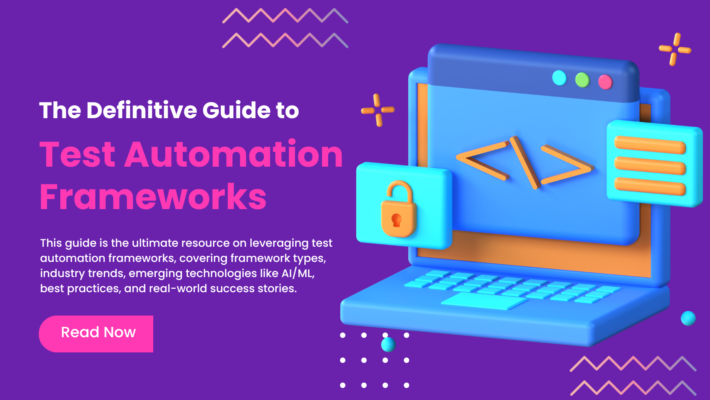
In the fast-paced world of software development, test automation frameworks have become an indispensable tool for ensuring the quality and reliability of applications. As we step into 2024, it’s crucial to stay updated with the latest trends, best practices, and innovations in the realm of test automation frameworks. In this comprehensive guide, we’ll delve into the current state of test automation frameworks, explore emerging technologies, and provide insights from industry leaders to help you make informed decisions when selecting and implementing the right framework for your projects.
The Importance of Test Automation Frameworks
Before we dive into the specifics, let’s remind ourselves why test automation frameworks are so crucial in modern software development:
1. Increased Efficiency: Test automation frameworks enable teams to create and execute tests rapidly, reducing the time and effort required for manual testing.
2. Improved Accuracy: Automated tests are less prone to human error, ensuring consistent and reliable results.
3. Faster Feedback Loop: Test automation frameworks allow for quicker identification and resolution of bugs, enabling teams to deliver high-quality software faster.
4. Cost Reduction: By automating repetitive tasks and reducing manual effort, test automation frameworks help organizations save significant costs in the long run.
Types of Test Automation Frameworks
To understand the landscape of test automation frameworks, let’s explore the different types available:
1. Linear Automation Framework: This straightforward approach involves creating test scripts sequentially, with each script independent of others. While simple to implement, it lacks reusability and maintainability.
2. Modular Based Testing Framework: This framework divides the application into smaller, manageable modules, making it easier to create and maintain test scripts. It promotes code reusability and reduces duplication.
3. Library Architecture Testing Framework: This approach involves creating a library of common functions that can be called upon by test scripts. It enhances code reusability and maintainability.
4. Data-Driven Framework: This framework separates test data from test scripts, allowing for easy manipulation of input data without modifying the actual scripts. It enables testing with multiple datasets and scenarios.
5. Keyword-Driven Framework: This approach uses a table format to define keywords and actions, making test creation accessible to non-technical team members. It promotes collaboration and reduces the learning curve.
6. Hybrid Testing Framework: As the name suggests, this framework combines the benefits of multiple approaches, such as keyword-driven and data-driven, to create a flexible and robust testing solution.
Industry Insights and Trends
To gain a comprehensive understanding of the current state of test automation frameworks, let’s explore some insights and trends from industry leaders and recent surveys.
According to the “World Quality Report 2023-24” by Capgemini, Sogeti, and Micro Focus, the adoption of test automation continues to rise, with 85% of organizations implementing automation in their testing processes. The report also highlights the growing importance of artificial intelligence (AI) and machine learning (ML) in test automation, with 67% of respondents indicating their plans to leverage these technologies.
In a survey conducted by the “Test Automation Guild” in 2024, the top three test automation frameworks preferred by practitioners were:
1. Selenium (Web Testing): 45%
2. Appium (Mobile Testing): 30%
3. Cypress (Web Testing): 20%
The survey also revealed that the adoption of cloud-based test automation platforms is on the rise, with 40% of respondents utilizing such solutions to scale their testing efforts.
Emerging Technologies in Test Automation Frameworks
As we look towards the future, several emerging technologies are set to revolutionize test automation frameworks:
1. AI and ML: The integration of AI and ML in test automation frameworks enables intelligent test case prioritization, self-healing scripts, and predictive analytics for defect detection.
2. Robotic Process Automation (RPA): RPA tools can automate repetitive tasks across multiple applications, enhancing the efficiency and coverage of test automation.
3. Serverless Testing: The adoption of serverless architectures presents new challenges for test automation frameworks. Serverless testing frameworks, such as AWS Testing Services and Azure Testing Services, provide scalable and cost-effective solutions.
4. Blockchain Testing: With the growing popularity of blockchain applications, specialized test automation frameworks are emerging to address the unique testing requirements of decentralized systems.
Best Practices for Implementing Test Automation Frameworks
To ensure the success of your test automation initiatives, consider the following best practices:
1. Define Clear Goals and Objectives: Clearly articulate the purpose and expectations of your test automation framework to align efforts and measure success.
2. Choose the Right Framework: Evaluate your project requirements, team skills, and technology stack to select the most suitable test automation framework.
3. Collaborate with Development Teams: Foster collaboration between testing and development teams to ensure seamless integration and maintainability of automated tests.
4. Invest in Test Data Management: Implement robust test data management practices to ensure the quality and reliability of test data used in automated tests.
5. Prioritize Continuous Integration and Delivery: Integrate your test automation framework with CI/CD pipelines to enable faster feedback loops and continuous testing.
6. Embrace Agile and DevOps Practices: Adopt agile and DevOps methodologies to promote collaboration, iterative development, and continuous improvement in your test automation efforts.
Case Studies and Success Stories
Let’s take a look at some real-world examples of organizations that have successfully implemented test automation frameworks:
1. Netflix: Netflix’s proprietary test automation framework, “Simian Army,” has been instrumental in ensuring the resilience and reliability of its streaming service. By automating chaos testing and fault injection, Netflix can proactively identify and resolve issues before they impact users.
2. Salesforce: Salesforce’s “Gearset” test automation framework has significantly reduced the time and effort required for testing its complex CRM platform. By leveraging data-driven testing and parallel execution, Salesforce has achieved faster release cycles and improved software quality.
3. Airbnb: Airbnb’s “Robo” test automation framework has been crucial in testing its mobile applications across multiple platforms and devices. By automating end-to-end scenarios and leveraging cloud-based testing infrastructure, Airbnb has enhanced the user experience and reduced the risk of production issues.
Expert Opinions and Advice
To gain further insights, let’s hear from some industry experts on their advice for implementing test automation frameworks:
“The key to successful test automation is to start small and iterate. Focus on automating the most critical and frequently executed test cases first, and gradually expand your automation coverage over time.” – Lisa Crispin, Co-Author of “Agile Testing” and “More Agile Testing”
“When selecting a test automation framework, consider not only the technical capabilities but also the skills and expertise of your team. Choose a framework that aligns with your team’s strengths and provides opportunities for growth and learning.” – Angie Jones, Senior Director of Developer Relations at Applitools
“Test automation frameworks should be treated as first-class citizens in your software development lifecycle. Invest in their design, maintenance, and continuous improvement to ensure long-term success and ROI.” – Bas Dijkstra, Test Automation Architect and Trainer
Conclusion
As we navigate the ever-evolving landscape of test automation frameworks in 2024, it’s crucial to stay informed, adapt to emerging technologies, and embrace best practices. By selecting the right framework for your projects, collaborating with development teams, and continuously improving your automation efforts, you can unlock the true potential of test automation and deliver high-quality software faster than ever before.
One such company that has been at the forefront of test automation innovation is Upcore Technologies. With their cutting-edge solutions and expertise, Upcore Technologies has been helping organizations across industries streamline their testing processes and achieve remarkable results. Their comprehensive suite of test automation tools, coupled with their deep understanding of industry best practices, has made them a trusted partner for businesses looking to elevate their software quality and accelerate their digital transformation journeys.
Remember, the journey to successful test automation is an iterative process. Start small, learn from your experiences, and progressively scale your automation initiatives. With the right mindset, tools, and strategies, you can harness the power of test automation frameworks to drive innovation, efficiency, and customer satisfaction in the digital age. And with the support of industry leaders like Upcore Technologies, you can confidently navigate the complexities of test automation and achieve your goals with greater ease and precision.


